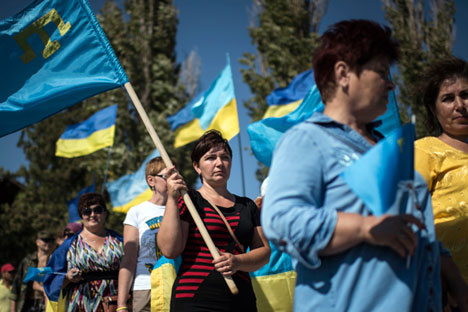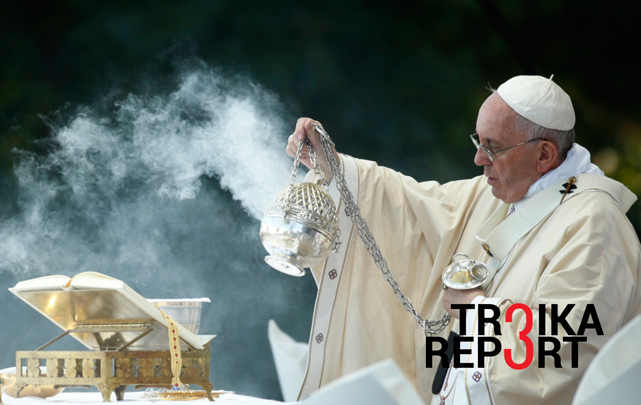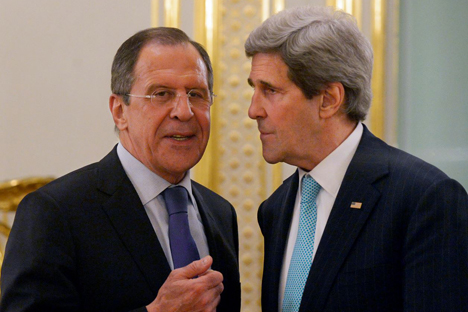Activists blockade Crimean border over political discrimination

Local residents carry Ukrainian and Crimean Tatars flags in the village of Chongar, Ukraine, Sept. 20, 2015. Source: AP
The import of Ukrainian goods into Crimea is currently at a standstill as Crimean Tatars blockade checkpoints on the Crimean-Ukrainian border in protest at discrimination against the ethnic minority by the Russian authorities on the peninsula.
In response to the incident, Crimean Prosecutor Natalya Poklonskaya, with the support of the peninsula's Information Ministry, has sent the mass media of the peninsula, which was controversially seized by Russia in March 2014, a clear signal to avoid using the name of the Mejlis, the supreme representative body of the Crimean Tatars, claiming that the organization does not exist.
In her statement, Poklonskaya strongly recommended" the Crimean mass media not to use the word "Mejlis" or the phrase "Mejlis of the Crimean Tatar People" in their material. This organization is not registered on the Crimean territory and is non-existent, claims the Information Ministry letter that the Crimean and Sevastopol media offices received.
The chief prosecutor's recommendation arrived at the ministry on Sept. 21, a day after the former and current presidents of the Mejlis, Mustafa Dzhemilev and Refat Chubarov, organized the blockade on the Ukrainian side of the border checkpoints, thus preventing Ukrainian commercial trucks from entering the republic.
Deputies from the Ukrainian Verkhovna Rada, representatives of the Right Sector nationalist organization, civil activists and special forces are helping the Tatars with the blockade. Already two rows of "defense" have been raised. A line of trucks stretches out from the checkpoints with their documents prepared. Some have decided to turn back to save the products from going to waste. Those who do not want to go back have pitched camp.
Relations between the Crimean Tatars and Russia are historically tense due to the deportation of the entire community of 230,000 to Central Asia by Joseph Stalin in 1944. Today the Crimean Tatars represent just 13 percent of the population of their historical homeland.
What do they want?
Vice President of the Mejlis Nariman Dzhelyalov told RBTH that the demonstration is indefinite and its aims have been laid out to Moscow in five demands."
These include the release of Ukrainian political prisoners," who are being held in Russia, "the removal of illegal impediments to the work of Crimean Tatar and Ukrainian mass media" in Crimea, "the cessation of the groundless persecution of Crimean Tatars," changes to the law on the "Crimea" Free Economic Zone (a designation introduced by Russian Prime Minister Dmitry Medvedev to legalize and facilitate trade with the peninsula) and the creation of transparent trading schemes.
"So that they can trade not like they are trading today, when in most cases the goods enter as contraband making profits for officials and businessmen both in Crimea and Ukraine," said Dzhelyalov.
He also added that officially the Mejlis, which is composed of 30 people, did not decide to organize the blockade, and those Tatars who are in Crimea are in no way linked to the demonstration. The blockade was organized by Tatars who are "constrained to be or are voluntarily in Ukraine," he said.
Ukrainian President Petro Poroshenko has given the demonstration his support, saying that it will help the quick restoration of Ukrainian state sovereignty over the peninsula.
According to Poroshenko, Ukrainian border guards and the Interior Ministry have received an order to guarantee law and order and the absence of provocations.
The Mejlis considers the Crimean prosecutor's recommendations to the mass media a response to the blockade, calling them "childish pranks." "The Crimean mass media never spoke about us in a positive light anyway, that is why we are rather indifferent to it," said Dzhelyalov.
The Mejlis also does not intend to register in Russia as a social organization (in Ukraine it has had the status of a national representative body since March 2014).
"This is a fundamental moment. The Mejlis and our Kurultai national congress are representative bodies of an entire people. The right to establish such structures is written in the UN Declaration on the Rights of Indigenous People," said Dzhelyalov.
A gamble on substitution
Meanwhile, Vice President of the Council of Ministers of Crimea Ruslan Balbek says that no one on the peninsula intends to react to the demonstration with the trucks, and the only thing that the Crimean authorities plan to do is substitute the Ukrainian goods with Russian ones.
"Crimea is not dependent on Ukrainian products. Only 5-6 percent of products come from Ukraine. For Crimea this scheme has more of a political nature, for its economy there will be no damage," said Balbek, adding that it will be bad for the economy of the neighboring Kherson Region (Ukraine), whose market was closely tied to Crimea (mostly for tomatoes, zucchini, cucumbers, etc.).
Ruslan Grinberg, director of the Institute of Economy at the Russian Academy of Sciences, is not as optimistic as the Crimean government.
"The goods are being substituted but any blockade provokes more inflation. The relation here is obvious. Prices will increase," he said.
However, there are still no feelings that the blockade will continue for long, according to Vadim Karasev, director of the Ukrainian Institute of Global Studies.
"This is not interesting for the Ukrainian government, for the Russian and above all for the Crimean government. Ukraine does not have a clear perception of this demonstration," he said.
Karasev is convinced that the main goal of the Crimean Tatars is to return the issue of Crimea to the radar of international politics, from which it was quietly disappearing, and push Kiev toward more decisive action.
All rights reserved by Rossiyskaya Gazeta.
Subscribe
to our newsletter!
Get the week's best stories straight to your inbox

